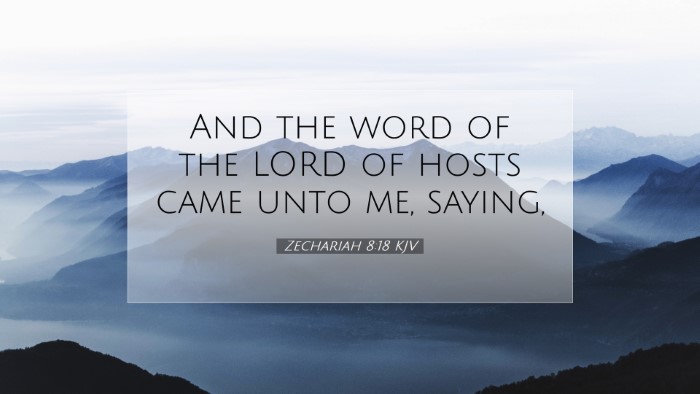Commentary on Zechariah 8:18
Zechariah 8:18 states: "And the word of the Lord of hosts came unto me, saying," which introduces a further revelation concerning the nature of God's blessings upon His people. This verse serves as a transition to the prophetic promise of restoration and the significance of fasts in the context of Israel's future.
Contextual Overview
The book of Zechariah is characterized by apocalyptic visions and prophetic encouragement, directed towards a post-exilic community struggling with their identity and covenant relationship with God. The verses preceding Zechariah 8:18 laid a foundation of restoration and hope, where God assures His people of His unwavering faithfulness amidst their struggles.
Insights from Public Domain Commentaries
Matthew Henry's Commentary
According to Matthew Henry, this verse is laden with divine communication, indicating a shift in God’s dealings with His people. He emphasizes the significance of the phrase "the word of the Lord of hosts" as a declaration of God's sovereignty and authority in Israel's history and future.
- God’s Favor and Acceptance: Henry believes this declaration is an assurance that God will favor His people, particularly after their repentance and recognition of their need for divine aid.
- The Nature of the Message: He notes that each message from God carries implications for moral and spiritual renewal. God’s intentions expressed through Zechariah are meant to evoke a response of faith from the people.
Albert Barnes' Commentary
Albert Barnes further elucidates the context of Zechariah 8:18 by correlating it with the traditional fasts observed by the Israelites. He posits that these fasts, which were meant to commemorate past tragedies, would be transformed into times of joy and celebration.
- Transformative Promise: Barnes emphasizes the prophetic shift from mourning to gladness, suggesting that the days of sorrow will be superseded by days of joyous celebration in the presence of God.
- Devotional Aspect: He also highlights the importance of genuine repentance and the subsequent joy that comes from restoration. The verse serves to motivate the community towards a deeper relationship with God as they experience His blessings.
Adam Clarke's Commentary
Adam Clarke provides an in-depth examination of the language and theological undertones in Zechariah 8:18. He discusses the implications of God's word and the assurances it offers to the remnants of Israel.
- Proclamation of Hope: Clarke indicates that the message of God, as brought forth by Zechariah, is a proclamation of hope and reassurance. It signifies a new spiritual reality for a community that has long suffered.
- Spiritual Significance of Fasts: Clarke reflects on the transition of the fasts from rituals of grief to markers of spiritual rejoicing, demonstrating God’s intention to renew their covenantal relationship.
Theological Implications
Zechariah 8:18 serves as a reminder of the covenantal faithfulness of God. Amidst human frailty and the consequences of sin, God's words bring clarity and promise. Pastors and theologians can draw several key theological insights:
- Divine Sovereignty: The phrase "the word of the Lord of hosts" reminds us that God’s plans are orchestrated in the heavens and extend to earth, demonstrating His control over history and events.
- Repentance and Restoration: As the Israelites are called to remember their past, their future is one of restoration, indicating the importance of repentance in spiritual revitalization.
- Celebration of God’s Goodness: The promise transformation of fasts signifies the joy that comes from understanding God's merciful acts. This encourages the church today to celebrate the redemptive works of Christ.
Pastoral Application
For pastors and church leaders, Zechariah 8:18 can serve as a powerful reminder of God’s transforming power in the lives of believers and the community. Key applications might include:
- Encouraging Renewal: Encourage congregations to move from a posture of mourning over past failures to one of celebration in God’s redemptive grace.
- Celebration of God's Faithfulness: Create opportunities for congregational worship that reflect joy in the face of God's promises and the realization of hope.
- Engaging in Repentance: Foster spaces for authentic repentance, clarifying that God not only desires acknowledgment of sin but also joyful restoration.
Conclusion
Zechariah 8:18 carries profound implications for the people of God. Through the lens of public domain commentaries, we see a narrative that encourages a transition from grief to joy, overwhelming assurance of love, and a call to embrace God’s transformative promises. As contemporary followers of Christ, we can draw strength from these truths, aligning our lives with the restorative work that God continues to perform among His people.


